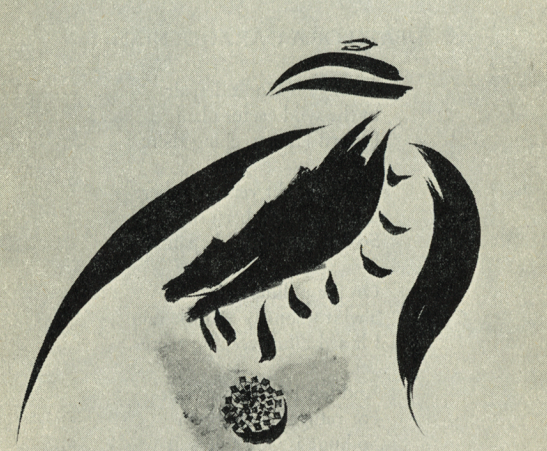
Jacques Hérold. From a portfolio in issue no. 26 of the Review (Summer–Fall 1961).
Parable of the Movie
“I like your movie. I can tell that horror is a big influence.”
“Thank you, yes, I love horror movies.”
“Oh, I didn’t mean horror movies. I meant horror.”
“Thank you again. The feeling of horror itself also happens to be one of my biggest influences.”
“You’re welcome. But I didn’t say anything about a feeling.”
“I beg your pardon, but what kind of horror is neither a movie nor a feeling?”
“Me.”
“But we just met. You didn’t influence my movie at all.”
“Well then. I take it back.”
*
The sound of the wind rustling the leaves in the part of the country from which he hailed eerily resembled the opening chords of the song “Do It Again” by Steely Dan.
*
A call about the job I applied for. I am invited to come in for an interview.
*
Parable of the Worm
Inoculated against the fact that their king was a worm, they watched his tense face as he devoured their kin, passed them through his gelatinous digestive tract, and shat them out, dropping them in a pebbled pile behind him. They cheered wildly, wiping tears from their cheeks.
Let there be commerce between us.
*
“There’s something,” she agreed, “suspiciously lordly about the way he sniffs the earth and licks his cloven foot. But it’s a mystery.” Several seconds passed. She fanned herself.
“It’s a mystery,” she said again.
*
Plants are so self-referential.
*
“One thing on which I’d like to think that we can all agree,” he said, furrowing his brow and gently blowing at the steam billowing off his matcha latte, “is that plants are witchcraft.”
*
“Of course,” I say in the job interview, wearing a light blue shirt and new gray blazer, “my preferred method of writing is collaborative.”
“That’s good,” my interviewer says, “because for this job, collaboration is essential.”
*
We’ve been watching The Sopranos for the first time. I read a literary critic’s skeptical take: that the show is merely asking whether a sociopath can be a good person. It’s a bad-faith reading by someone who hates the medium. Not interesting. The Sopranos isn’t about that. It’s about what happens to the rest of the world—not you—when you die: it goes on, until the network cancels the run. And it’s persuasive.
*
I notice tonight that I habitually steal little moments to check my pulse.
For how long has this been going on?
*
Dream, 7/18
“Sometimes I just sit with a petri dish and wait a week.”
*
Sounds like laughter in the third movement of the Jupiter symphony.
*
How much baby’s breath would a woodchuck chuck if a woodchuck were into that kind of thing?
*
As I continue to be ravaged by the blunt object that is a series of years on Earth, I am surprised to find that I have more occasion to use the word than than then.
*
Parable of the Tick
Tonight I see what looks to be a tick on the dog’s eyelid. I get a pair of tweezers from the bathroom and kneel to remove it. He looks at me askance but lies there in his beatific patience. I smooth the fine yellow fur on his head and apply the tweezers to the tick and clamp down.
But it is not a tick—just a little black growth above his eye. A stream of blood trickles down his snout, but he doesn’t flinch. I gasp. He leans forward and licks my hand—to ease my parasitic fret, to forgive me for hurting him—with blood in his fur. I burst into tears.
Love is hell.
*
I receive a call informing me that I got the job. I’ll begin in August.
Why does this feel sad?
*
Parable of A. J. Soprano
Spoiler alert.
After unsuccessfully trying to commit suicide by tying a cinder block to his feet, putting a plastic bag over his head, throwing himself into the family pool—the prelude to perhaps the most piercingly moving scene of the entire series—A. J. is still, with a persistence approaching the divine, a complete asshole.
*
The fly on the engraved mirror—resting on the back of its wings with its legs in the air, its reflection hanging from the glass as if about to launch off into the room—is sleeping, or spoiled?
Daniel Poppick is the author of The Police and of the National Poetry Series winner Fear of Description.
from The Paris Review https://ift.tt/YKw6Q2W
Comments
Post a Comment